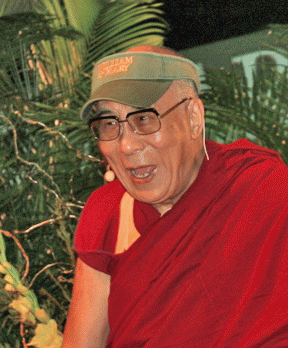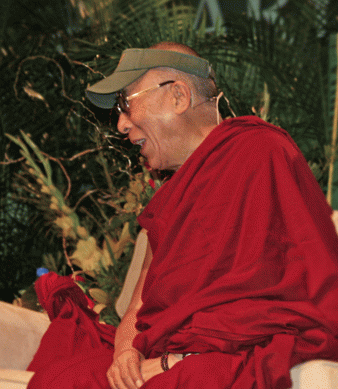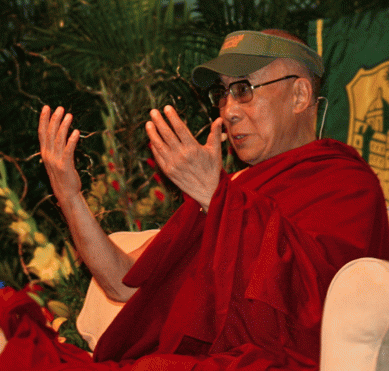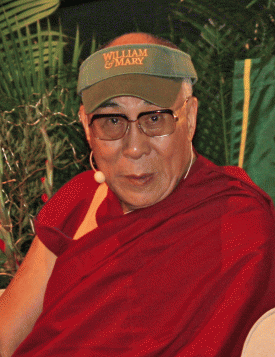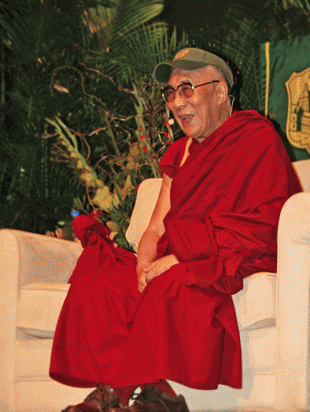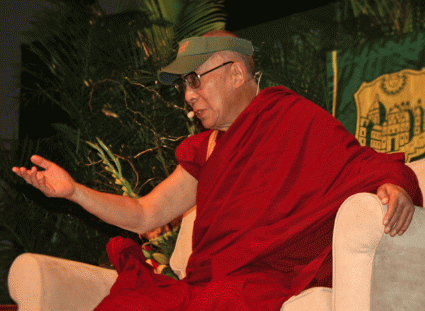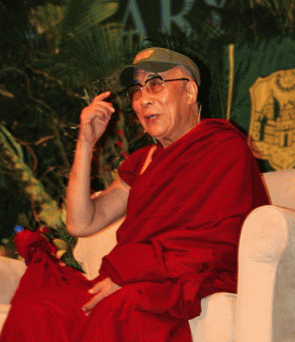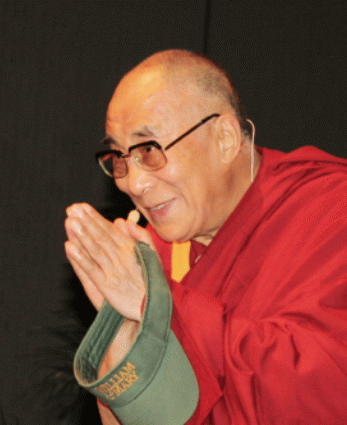Williamsburg, VA. It was a dark and stormy night, and an overcast morning, but before I had driven halfway to my destination -- a presentation by His Holiness the Dalai Lama -- the sun broke through the clouds to enlighten the world.
His Holiness the 14th Dalai Lama, Tenzin Gyatso, spoke on Human Compassion at the College of William and Mary to a live audience of over 8200, and another 9700 internet viewers on October 10th.
The Dalai Lama has promoted peace by visiting 62 countries on 6 continents, written 72 books, and received many awards, including the Nobel Peace prize in 1989.
Rector of the College, Jeffery B. Trammell, noted that it was especially appropriate to welcome His Holiness to the campus at this time, the 250th Anniversary of the Commencement of Thomas Jefferson from the College of William and Mary, as Jefferson authored the Virginia Statues of Religious Liberties.
The Dalai Lama began his address to "Brothers and Sisters," noting that we are, indeed, all brothers and sisters in spite of our differences.
He said that "I feel, many trouble that we are facing, is our own creation," noting that too much emphasis is placed on differences, especially religious differences, as well as differences in race, color, and nationality; and that "if we go to fundamental level, we are same human being."
He explained that the foundation of peace is compassion, and the foundation of compassion is right thinking.
When he said he had a story to share about former president George Bush, eight thousand pairs of ears perked up.
"I really love him, really, very nice person on human level," said His Holiness to a clearly astonished audience. His Holiness recounted the first time he met Bush, mentioning that the encounter was casual and friendly: "immediately we developed closest feelings ... immediately, we became very close friends."
But the second time they met was after the invasion of Iraq. His Holiness smiled as he said, "I told him "I love you, I respect you, I admire you " but, (with) some of your policy, (pointing his finger) -- I have some reservation."
The Dalai Lama noted that Buddhists do not believe in using force or violence, and said, "We have to find a new way of thinking, a new way of approach, when we face problems -- rather than a reliance upon force, a tendency he gently accused the U.S. of using too liberally.
He encouraged the use of a general sense of compassion "as a seed," and then employing human intelligence to develop it.
The Dalai Lama offered these steps:
1. In order to develop a realistic approach to solving a problem, we must study the reality of the problem.
2. In order to be able to discern the reality, our mind must be calm. Too much negativity, hatred or anger, makes your mind one-sided. "The one-sided mind cannot see the reality objectively," he noted.
3. The practice of compassion can help to develop a calm mind, capable of greater discernment.
The Dalai Lama noted that even animals practice compassion; a baby animal's survival depends on its mother's compassion. All mammals have, by nature, what he said could be called limited compassion. Noting that is the biological factor, he termed it "general compassion."
Then His Holiness explained that Human Compassion is general compassion that has been enhanced by intelligence. He believes that humans have the capacity to extend our love and compassion beyond our own loved ones, to strangers and even enemies.
He said, "Our existence, our joyfulness, very much depends on the rest of community," noting that cultivating positive peace in the community results in a happier life for everyone. "A human being is a social animal" a happy (future) depends on the community."
Animals can't analyze like this, he noted. The ability to intellectually analyze long-term benefits is a human trait.
His Holiness offered another story. He shared that while he owns a television, at one point, he had not turned it on in two years.
Shocked, a young person from India asked, "Then, how do you pass your time?"
His Holiness smiled and paused, and his reply drew much laughter: "I think."
He acknowledged that it is hard for humans to love an enemy, but it is not required to love their actions, only their humanity.
"(Every one) has every right to achieve a happy life."
See the archived video of HH The Dalai Lama's presentation here: http://www.wm.edu/sites/dalailamavisit/video/index.php



